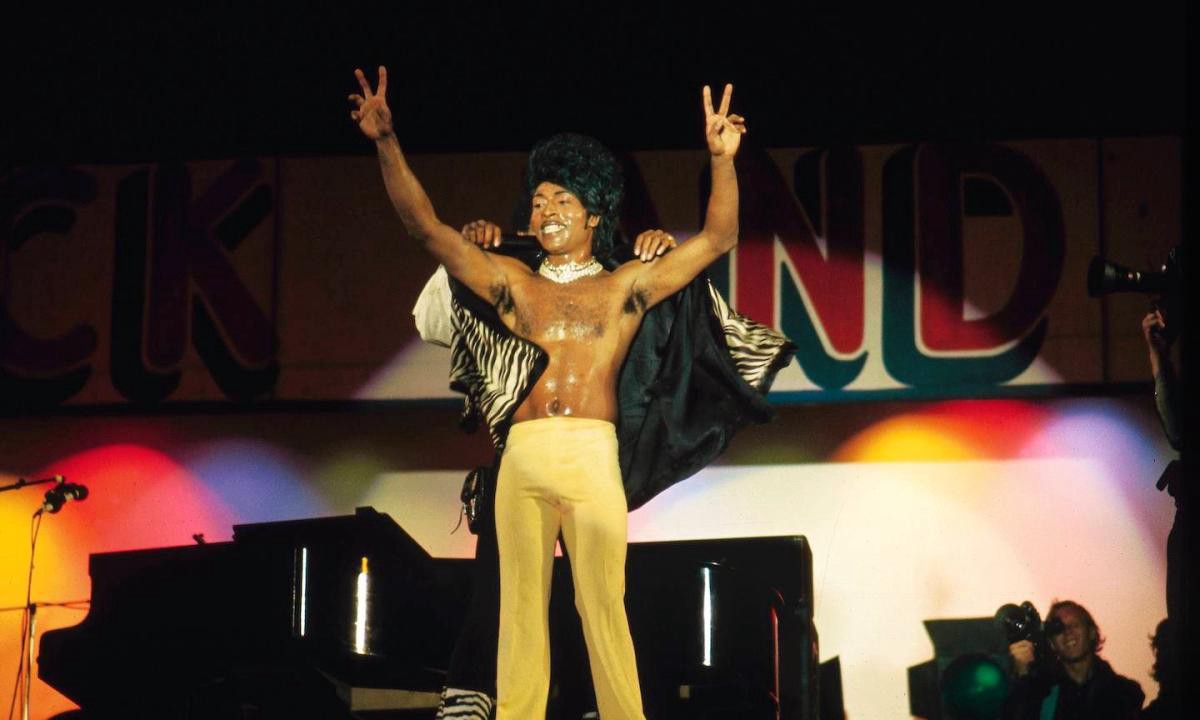Little Richard: I Am Everything is positively bursting with unforgettable anecdotes, so much so that choosing one standout is virtually impossible. So perhaps offering a personal favorite is more sensible: it was the late ’60s and Richard was performing in the States on a bill that included Janis Joplin. The latter appeared first and destroyed the audience with her passion and verve. Richard, watching from the side of the stage, told a cohort to get to the hotel and retrieve his “mirror suit.” Challenge accepted: when his performance began the lights reflected beautifully off the suit. He was a living mirror ball, resplendent, transcendent. Joplin, watching from the wings, could only utter “Oh my God.”
Janis’ words are fitting. They capture the vivid feeling of hearing––to say nothing of actually seeing––Little Richard at the height of his powers. And of course there is her reference to God. As Lisa Cortés’ remarkable documentary demonstrates, Richard’s life was a constant struggle between the religious beliefs instilled during childhood and his desires for sex, love, and musical magnificence.
Rarely has a music doc so successfully checked all of the usual boxes––difficult upbringing, disapproving father, the first signs of prodigious talent, successes, and downfalls, all bolstered by talking heads and archival footage––while highlighting the contradictions and personal failures of its subject with respect and awe. There are numerous moments that call to mind other recent documentaries, e.g. Brett Morgen’s stupendous Moonage Daydream. But just as the artist born as Richard Wayne Penniman was unlike any other performer, so too does I Am Everything chart a unique path.
The Oscar-nominated and Emmy-winning Cortés identified the appropriate interviewees for a film about an artist who blurred gender lines, broke color barriers, helped create the concept of the “teenager,” and was, in his own words, “the emancipator and the architect.” So in addition to musical figureheads (Mick Jagger, Tom Jones) there are figures like transgender trailblazer Sir Lady Java, the great John Waters, and actor-performer Billy Porter. Some of the most insightful commentary is from scholar-authors like Jason King and Zandria Robinson. The latter adroitly argues that singers most influenced by Richard––the Beatles, Jagger, David Bowie––contributed to the attempted obliteration, rather than appropriation, of his work.
Similarly, King zeroes in on the contradictions of Little Richard’s trailblazing queerness: “He was very, very good at liberating other people through his example. He was not good at liberating himself.” Much of the film is focused on these elements of Richard’s life and influence. This is appropriate: he personally struggled while detonating societal norms. “The first songs that you love that your parents hate [are] the beginning of the soundtrack of your lives,” John Waters explains. “Little Richard gave me the fuel to rebel.”
If Little Richard: I Am Everything consisted only of archival film footage and photos it would still mark an important creation. Consider the remarkable images of Richard performing in drag as “Princess Livonia,” or the photos of a besuited, clean-cut Richard attending the conservative Oakwood College in the late 1950s. This was after an airplane incident inspired him to forsake rock ‘n’ roll and pledge his devotion to God. Then there are the breathtaking, otherworldly sights of Richard in day-glo stage outfits, or bare-chested and swinging his shirt before a swooning crowd. And if it was simply a series of remembrances from Richard’s musical collaborators and friends, that too would have been fascinating.
I Am Everything, however, is all that and more. In its final act the film heightens arguments for Little Richard’s status as, in his words, “the one that started it all.” This is not hyperbole. Sadly, Richard was often ignored or laughed at by an industry that was more than happy to profit from his genius. Cortés shows that the oft-parodied lifetime achievement award––yes, it is hard not to think of Walk Hard and the recent Weird: The Al Yankovic Story––truly mattered when it came to Little Richard. It was a 1997 American Music Awards Award of Merit that seemed to finally give Richard the props he so deserved. The clips are tremendously moving, more so because his emotional acceptance speech was followed by a raucous “Good Golly Miss Molly.” Little Richard was everything, and thanks to Lisa Cortés’ film his influence on everyone from Elvis Presley and Jimi Hendrix to Bad Brains and Harry Styles can never again be doubted.
Little Richard: I Am Everything premiered at the 2023 Sundance Film Festival and will be released by Magnolia Pictures this April.

